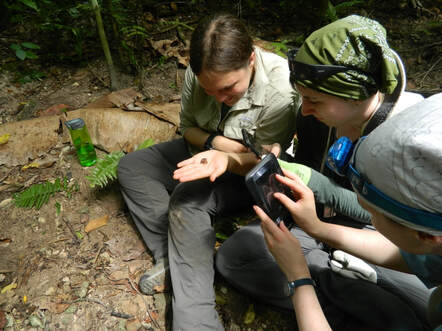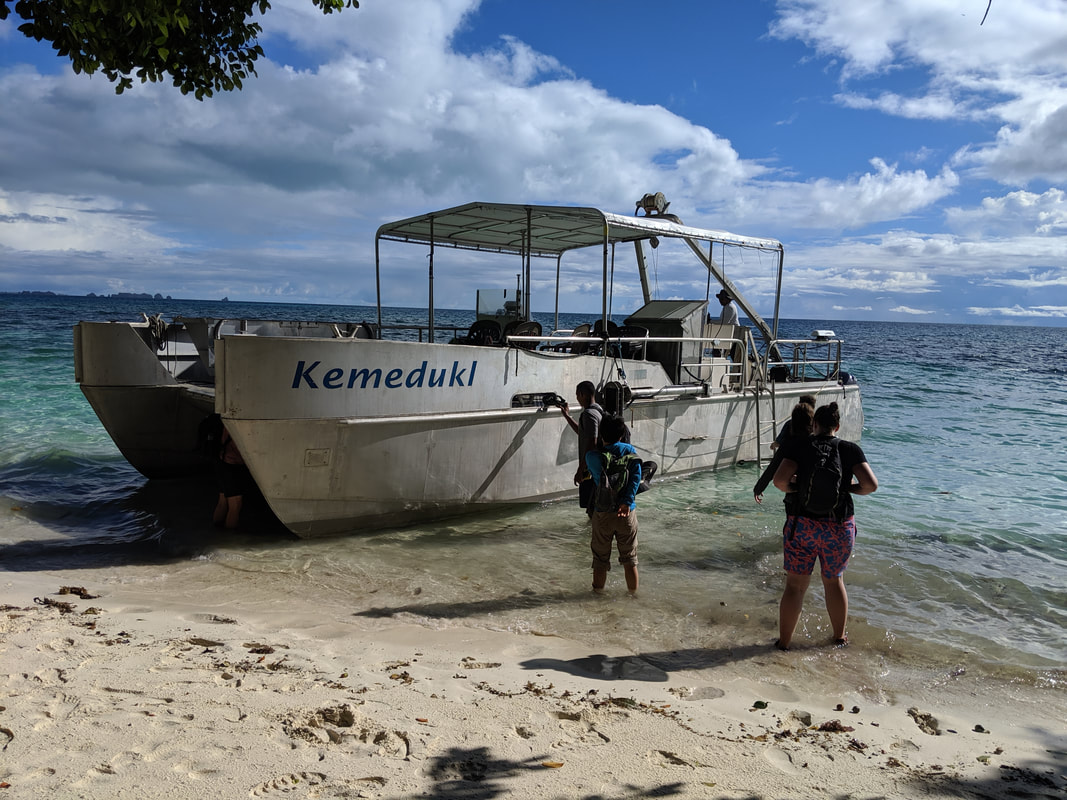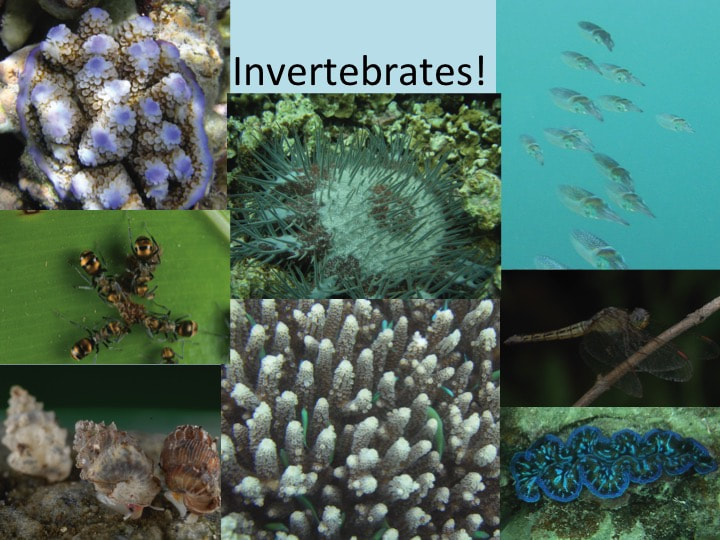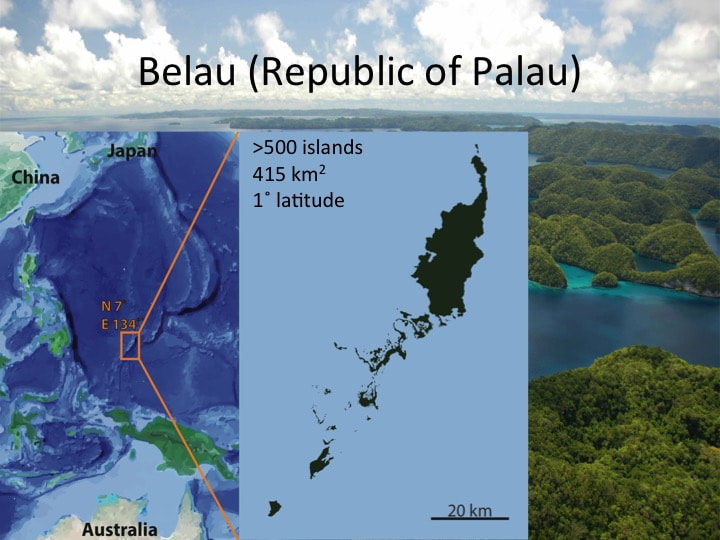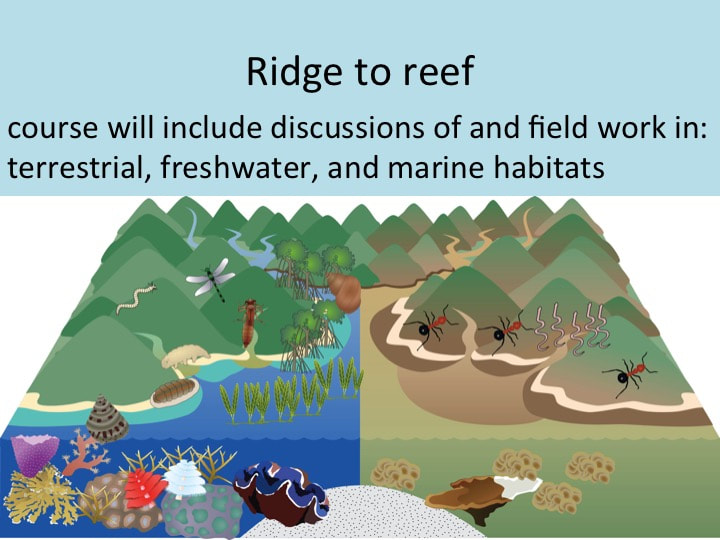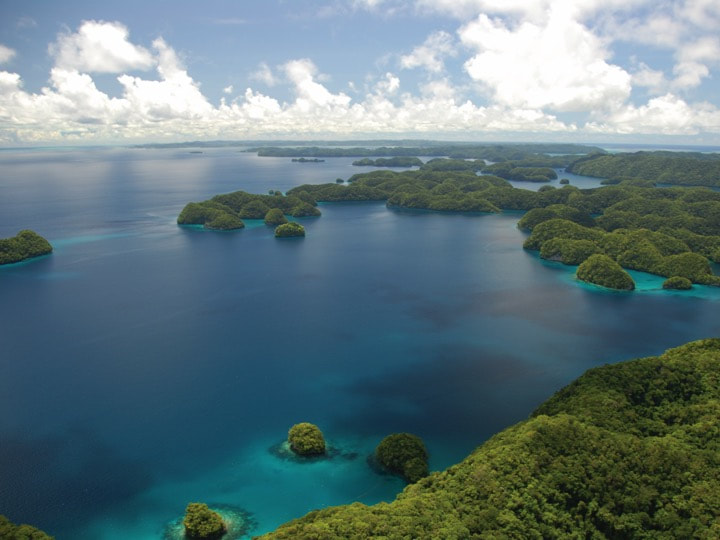Habitats of Palau | Invertebrates of Palau
EFB 500: Invertebrate conservation biology in Palau: from ridge to reef
Instructors: Jesse Czekanski-Moir (SUNY-ESF), Rebecca Rundell (SUNY-ESF), Anuschka Faucci (Univ. Hawaii Leeward CC), Carla Atkinson (Univ. Alabama)
Credits: 3 (undergraduate and graduate, with instructor permission)
Grading: A - F (see below for more details)
Mode of Instruction: Four meetings during spring semester followed by 90+ contact hours of field work, site visits, and lectures in Palau; One final 5 - 7 page paper due three weeks after field component.
Prerequisites: EFB 311 (Evolution) and EFB 320 (Ecology), or permission of the instructor
Suggested: EFB 355 (Invertebrate zoology)
Description
This course will introduce students to the complexities of the conservation biology of invertebrates in a small tropical country. We will emphasize the similarities and differences in doing conservation biology in terrestrial, freshwater, and marine habitats. We will review foundational concepts in ecology and evolution as they relate to conservation biology, and will touch upon the interplay of geology, anthropology, geopolitics and economics that have conspired to make the Republic of Palau such an interesting place. Relevant aspects of the biology of invertebrates will be reviewed.
We are hosted by the incomparable Coral Reef Research Foundation in the Republic of Palau. Check out their website to better understand how lucky we are! CRRF also conducts research on the jellyfish lakes of Palau and deploys the Kemedukl vessel above. https://coralreefpalau.org/
Learning objectives
By the end of the course, students should:
- Understand ecological and evolutionary underpinnings of invertebrate speciation, extinction, and invasion
- Be able to conduct surveys of invertebrate diversity in coral reef, mangrove, upland forest, and stream habitats
- Develop (or improve upon) basic competency in free software tools: R, QGIS, and imageJ
- Develop an increased understanding of evolution, ecology, and biogeography of Pacific island invertebrate animals, particularly with respect to the Palau archipelago
- Understand some of the key conservation concerns for invertebrates in Oceania and SE Asia
- Understand conservation concerns specific to Palau, and how those relate to both cultural traditions of Palau and global geopolitics
- Develop an increased understanding of the ways in which conservation biology draws from disciplines such as ecology, evolutionary biology, economics, and sociology/anthropology
- Develop an increased appreciation for the diversity of invertebrates and a desire to share this appreciation with students and members of the public
Learning outcomes
To receive full credit for the course, students must:
- Contribute one entry to the course blog, and comment on two other entries
- Give a 30-minute lecture (without powerpoint) to a high school class on a conservation biology topic of their choice
- Give a 15-minute “how to” presentation to the class on a way in which they used one of the software tools to analyze class data
- Complete a 5 - 7 page paper on the conservation biology of a taxon or functional guild of their choice from Belau (due circa June 15th; two weeks after the course is over)
Course impacts to conservation in Palau
- A course blog, constructed during the spring semester, will highlight scientific publications relevant to invertebrate conservation in Palau (and beyond)
- Lectures will be open the public, and local college students will be encouraged to attend
- Students will be required to conduct an outreach activity to local primary and secondary schools
- Inventories of 2 - 3 marine, 2 - 3 terrestrial, and 1 - 2 freshwater habitats will be made available to conservation practitioners and educators in Palau. If (as we hope) the course is repeated on a regular basis, these inventories will combine to give valuable, thorough information about invertebrate abundance and species richness through time that will be made accessible to local NGOs such as the Palau Conservation Society, which are in regular communication with state conservation managers.
Further Information:
Please check out these links for some of the organizations we'll be collaborating with in Palau!
http://coralreefpalau.org/
http://www.palaupanfund.org/ngardok.html
http://picrc.org/picrcpage/
http://palauconservation.org/
http://pcc.palau.edu/
http://belaunationalmuseum.net/
Instructors: Jesse Czekanski-Moir (SUNY-ESF), Rebecca Rundell (SUNY-ESF), Anuschka Faucci (Univ. Hawaii Leeward CC), Carla Atkinson (Univ. Alabama)
Credits: 3 (undergraduate and graduate, with instructor permission)
Grading: A - F (see below for more details)
Mode of Instruction: Four meetings during spring semester followed by 90+ contact hours of field work, site visits, and lectures in Palau; One final 5 - 7 page paper due three weeks after field component.
Prerequisites: EFB 311 (Evolution) and EFB 320 (Ecology), or permission of the instructor
Suggested: EFB 355 (Invertebrate zoology)
Description
This course will introduce students to the complexities of the conservation biology of invertebrates in a small tropical country. We will emphasize the similarities and differences in doing conservation biology in terrestrial, freshwater, and marine habitats. We will review foundational concepts in ecology and evolution as they relate to conservation biology, and will touch upon the interplay of geology, anthropology, geopolitics and economics that have conspired to make the Republic of Palau such an interesting place. Relevant aspects of the biology of invertebrates will be reviewed.
We are hosted by the incomparable Coral Reef Research Foundation in the Republic of Palau. Check out their website to better understand how lucky we are! CRRF also conducts research on the jellyfish lakes of Palau and deploys the Kemedukl vessel above. https://coralreefpalau.org/
Learning objectives
By the end of the course, students should:
- Understand ecological and evolutionary underpinnings of invertebrate speciation, extinction, and invasion
- Be able to conduct surveys of invertebrate diversity in coral reef, mangrove, upland forest, and stream habitats
- Develop (or improve upon) basic competency in free software tools: R, QGIS, and imageJ
- Develop an increased understanding of evolution, ecology, and biogeography of Pacific island invertebrate animals, particularly with respect to the Palau archipelago
- Understand some of the key conservation concerns for invertebrates in Oceania and SE Asia
- Understand conservation concerns specific to Palau, and how those relate to both cultural traditions of Palau and global geopolitics
- Develop an increased understanding of the ways in which conservation biology draws from disciplines such as ecology, evolutionary biology, economics, and sociology/anthropology
- Develop an increased appreciation for the diversity of invertebrates and a desire to share this appreciation with students and members of the public
Learning outcomes
To receive full credit for the course, students must:
- Contribute one entry to the course blog, and comment on two other entries
- Give a 30-minute lecture (without powerpoint) to a high school class on a conservation biology topic of their choice
- Give a 15-minute “how to” presentation to the class on a way in which they used one of the software tools to analyze class data
- Complete a 5 - 7 page paper on the conservation biology of a taxon or functional guild of their choice from Belau (due circa June 15th; two weeks after the course is over)
Course impacts to conservation in Palau
- A course blog, constructed during the spring semester, will highlight scientific publications relevant to invertebrate conservation in Palau (and beyond)
- Lectures will be open the public, and local college students will be encouraged to attend
- Students will be required to conduct an outreach activity to local primary and secondary schools
- Inventories of 2 - 3 marine, 2 - 3 terrestrial, and 1 - 2 freshwater habitats will be made available to conservation practitioners and educators in Palau. If (as we hope) the course is repeated on a regular basis, these inventories will combine to give valuable, thorough information about invertebrate abundance and species richness through time that will be made accessible to local NGOs such as the Palau Conservation Society, which are in regular communication with state conservation managers.
Further Information:
Please check out these links for some of the organizations we'll be collaborating with in Palau!
http://coralreefpalau.org/
http://www.palaupanfund.org/ngardok.html
http://picrc.org/picrcpage/
http://palauconservation.org/
http://pcc.palau.edu/
http://belaunationalmuseum.net/
